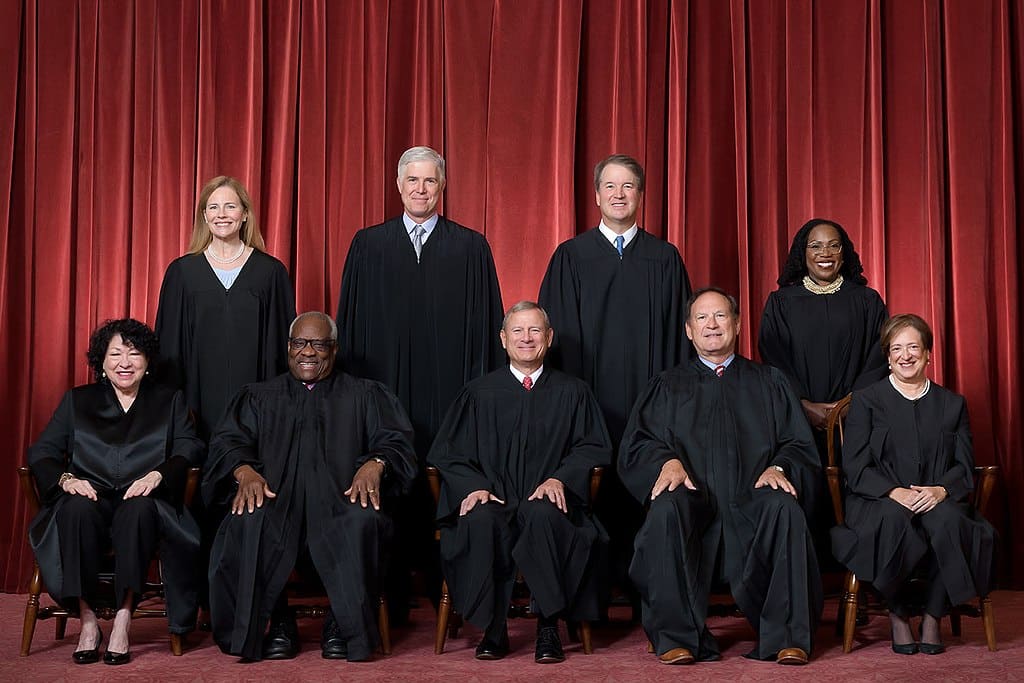Monday marked the start of the 2023-2024 Supreme Court term, with new cases and the Justices’ ethics as points of focus.
Among the cases to watch in the Supreme Court this term:
Barring accused domestic abusers from buying guns. At issue is the Justices’ ruling in New York State Rifle & Pistol Association v Bruen, challenging a law requiring that one reveal a special need for self-protection to receive an unrestricted license to carry a concealed firearm outside the home.
In 2022 the Supreme Court struck the law down, concluding that it violated the Second Amendment as well as the 14th Amendment by preventing law-abiding citizens with ordinary self-defense needs from exercising their right to keep and bear arms in public.
Now the Supreme Court is taking up a ruling earlier this year by a unanimous panel on the 5th Circuit Court of Appeals, citing Bruen, that struck down a federal gun regulation preventing domestic abusers from possessing firearms. It came out of an appeal from Zackey Rahimi, who had been prosecuted in 2020 for possessing firearms after being slapped with a protective order because of a violent altercation with his girlfriend.
The federal government is challenging the 5th Circuit’s ruling.
Gerrymandering of South Carolina’s Congressional maps. The Supreme Court will consider a Congressional redistricting plan drawn by South Carolina’s Republican-controlled legislature in the wake of the 2020 census.
The South Carolina State Conference of the NAACP and a Black voter named Taiwan Scott, are challenging the state’s Congressional District 1 that is located along the southeastern coast and is anchored in Charleston County, after the person who devised the map testified that he was instructed to make the district “more Republican leaning,” though he asserts he did not consider race while doing so.
The case comes after the Supreme Court ruled that Alabama must redraw its Congressional maps to include two majority-Black districts out of a total of seven to better reflect the state’s more-than one-fourth Black population.
Funding the Consumer Financial Protection Bureau (CFPB). The Justices will review a federal appellate decision holding that the CFPB was unconstitutionally funded.
The case before the Supreme Court is the continuation of a three-year-old battle in which opponents have targeted the CFPB’s structure in its attempt to dismantle its authority surrounding consumer safeguards such as mortgages, car loans, credit cards and other lending practices.
In a 5-4 decision, the Supreme Court in June 2020 struck down the CFPB’s single-director setup but allowed it to otherwise continue operating. At issue is the fact that Congress established the consumer watchdog’s funding outside the usual appropriations process to ensure the agency’s independence.
Purdue Pharma bankruptcy settlement. The Supreme Court in December will look at the pharmaceutical giant’s multi-million dollar bankruptcy settlement with several states that would ultimately offer the Sackler family, which formerly controlled Purdue, broad protection from OxyContin-related civil claims.
The Biden Administration has called an agreement to allow the Sacklers to contribute up to $6 billion for Purdue’s reorganization in exchange for release from civil liability “exceptional and unprecedented.”
States laws governing social media. The Justices agreed to look at laws in Florida and Texas which allow their state legislators to essentially control how social media companies operate.
Republican-elected officials in several states that have similar measures support the Texas and Florida laws, having sought to portray social media companies as generally liberal in their ideologies and hostile to ideas from the political right.
The tech sector has warned that the laws would prevent platforms from removing extremism and hate speech.
Will the Court adopt a Code of Ethics?
The new Supreme Court term is beginning amid a growing call from Congress and elsewhere that the Justices end their practice of being virtually the only court in the United States that does not adhere to a formal code of ethics.
Amid months of reporting by the non-profit news outlet ProPublica revealing that Justice Clarence Thomas “has secretly reaped the benefits from a network of wealthy and well-connected patrons,” Senate Judiciary Chair Dick Durbin (D-IL) has warned that if Chief Justice John Roberts doesn’t adopt a formal code of ethics for the Court, Congress will create a code for it.
Reporting by ProPublica and others on Supreme Court ethics practices has targeted liberal Justices as well as conservatives, which would only seem to underscore the need to hold the Supreme Court to a formal code of ethics.
Though Roberts has pushed back on the idea of adopting a formal code, just last month Justice Elena Kagan spoke publicly in support of the idea, saying it would be a “good thing for the Court” to adopt a code of ethics, adding that it would “go far in persuading other people that we were adhering to the highest standards of conduct.”


